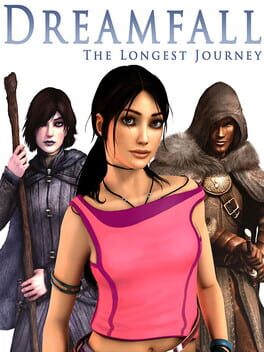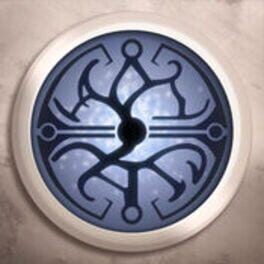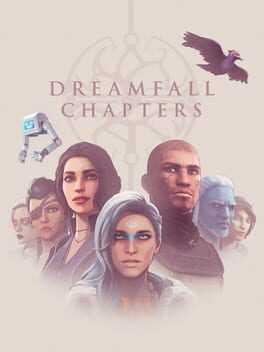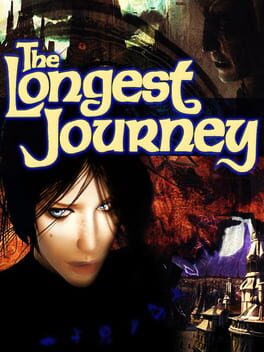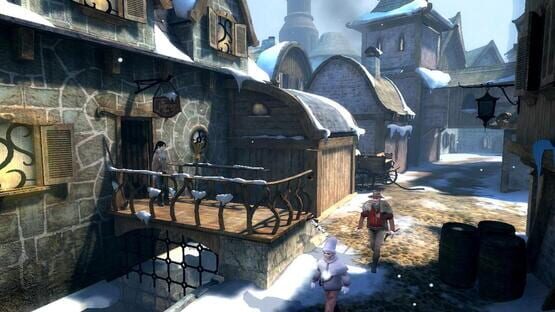

Dreamfall: The Longest Journey, winner of multiple E3 awards as the best game in its genre, is the continuation of a saga that began in the award-winning The Longest Journey, considered to be one of the finest adventure games ever made. In Dreamfall, players are taken on an epic journey of exploration and adventure as they venture through a thrilling and emotional storyline. Dreamfall features a fully interactive world where beautiful music, stunning graphics, fascinating characters and unparalleled gameplay variety promises to bring the adventure genre into a new era. Prepare for a spiritual, fantastic and powerful gaming experience.
Also in series
Reviews View More
Dreamfall: The Longest Journey was released in 2006, a good seven years after the original game and into a different gaming landscape. Classic click n point adventures games had sung their formal swansong years earlier and now only existed in the dreams of random German bedroom developers, and the world was still several years away from either the Kickstarter revival of the genre or its commercially successful metamorphosis into narrative-driven indie games that did away with the puzzles but focused on other aspects of the medium. The balance in the field had also started to shift away from PCs and to consoles, and developing a PC-only adventure game was basically a guaranteed commercial suicide. Funcom didn't have an easy task ahead of them: they had to reinvent the basic gameplay loop, make it work on an entirely different controlling mechanism, and narratively pull something out of the bag that would act both as a genuine continuation for the old fans as well be able to get any newcomers, who might not have even heard of the first game, invested.
Dreamfall stumbles on each and every aspect of the above, and replaying it has only made it more obvious.
The big one is that Dreamfall simply isn't exciting - or fun - to play. Rather than click around in a 2D puzzler, you now control the character (one of three - I'll get to that) directly through a 3rd person perspective in a 3D environment, and at first everything seems ok: you've got an inventory, and games like Gabriel Knight 3 and Grim Fandango had proven that the genre could not only translate to a 3D environment well but take interesting advantages of the new dimension. Dreamfall doesn't do anything like that and despite the new possibilities, it strips down gameplay elements and turns out to be a game that is genuinely frustratingly linear. The puzzles are perfunctory and 95% of them require the player to interact with an environmental object, go to the previous room and pick up an item, and then use that item on the object. They take about 30 seconds to complete and feel like perfunctory busywork to give the illusion that Dreamfall is an old school puzzler; sometimes you even get to combine items, but these items are also typically literally next to one another in the gaming world. The puzzles are so simple that you actually wish they weren't there, because all they do is slow down the narrative for no real reason like a task you have to tick before you're allowed to move forward: there's such a thing as an easy puzzle, and then there's needless admin. The actual gameplay then consists of simply running around from one screen to the next, finding the next piece of spelled-out busywork to tick. The tedium is sometimes broken by minigames depicting lockpicking (actually decent) and hacking (tedious), stealth sections (awkward and frustrating) and combat. The latter is such an obvious dictionary example of a forced action mechanic that has been included purely for marketing purposes: it's universally terrible but at least it's so easy in its mindnumbing simplicity and bad AI that you can do away with it in a moment's matter.
You can also tell that Funcom were struggling with the development in general. The mid-2000s were a particularly awkward time for PC gaming because the massively exploded console market demanded that these platforms had to be considered if you wanted to make a profit with your game, and the hardware and controlling limitations of the Playstation and XBox compared to the PC could really mess with gaming studios who had formerly only ever developed for the PC. At the time this was called consolitis and though the term reeks of PC gaming master race subreddits, the unfortunate name does describe a genuine phenomenon of PC dev teams' botched attempts at streamlining concepts and designs when dealing with the market-demanding limitations. Dreamfall is full of the traditional hallmarks of the effect: massively segmented gameplay areas full of loading screens, minimal interactivity within the environment and supersized menus with less information. The grand city of Marcuria feels smaller in this game than in TLJ despite the extra dimension because it's been split into claustrophobically tunneled areas within small sectors, all the environments feel hollow and devoid of life, and the new main protagonist Zoë's simple microblog entries look tragic compared to April's lengthy journal rambles about her experiences in TLJ.
If The Longest Journey felt like a grand adventure that seemed larger than life and conjured the most incredible vistas and scenes, Dreamfall is like walking the same corridor over and over again. You're told that the building is incredible and has several stories, but all the stairs are awkwardly blocked with ankle-high boxes, every single door is locked and you have to follow the railings to the one room you can enter. I like linear games but Dreamfall takes it to an awkward extreme.
This could be saved by the plot - after all, I love a lot of those of hyperlinear indie narrative adventures that are spiritual successors of the genre in the modern day. And to Funcom's credit, Dreamfall starts out very well. Despite the gameplay interruptions, Dreamfall's initial narrative does get you hooked: Zoë's story arc starts small but despite some contrivances (Zoë's hacker friend is too convenient and one-dimensional) it eventually begins to weave old familiar themes (and worlds and people) and new ideas together in a manner that's actually compelling, even on a replay (though I had forgotten some of the detail, once more). At least if you're a TLJ veteran, which is the perspective I'm coming from: I don't feel that much of the Arcadia side of things is ever really explained thoroughly enough that a complete newcomer could have a full grasp of what's happening and why, and I don't think the writing does a particularly good job of making sure newcomers are treated as evenly as experts. You meet and get to play as April too, now almost a new character after a decade of feeling lost both physically and mentally following the events of TLJ but somewhere inside that gruff demeanour is something recognisable.
Then things begin to fall apart. The further you dwell in the (mostly) Stark-side plot with Zoë the more it becomes a pile-up of random clichés thrown on top of one another (ghost girls, corporate espionage action sequences, conspiracies and secret pasts, corrupt megacorps etc) and eventually you lose track of what you're meant to actually pay attention on, and Zoë's character (and acting) somehow gets less engaged the more you play. In Arcadia, the potential depth in April's personal journey transforms into one-note, out-of-character angst that torpedoes any dialogue (even the return of Crow - still the best character - doesn't help). The third character, the religious zealot Kian, also gains more prominence from halfway point onwards: he has the personality and presence of a balsa wood chair, has the most action sequences out of all the characters and even though you can predict every story beat of his arc it is still executed so haphazardly that you can't believe that it ends up where it does. Sometimes even the wider issues of the game affect the narrative, with the different characters ending up in the same recycled environments in Arcadia over and over again always feeling more like asset reusage than genuine plot requirement.
What I was most looking forward to was the ending though, which I vividly remember completely screwing me up emotionally when I was younger - it's not a happy ending and even though it's telegraphed right from the start, how it was pulled off affected me a lot when I first played through the game. I'm glad to say that the game does pick itself back up in its very last moments and it still has some beautifully sad moments to it... but I didn't find it so powerful this time around because I was so much more aware of just how much the game does away with on the way to the big final beat. Dreamfall is the middle part of a trilogy and like all the worst middle parts, loads itself up with so many cliffhangers and raises so many questions that are left unanswered that it's downright unsatisfactory. What could be a poignant ending is somewhat dampened when I realised that even with the attention span of an adult, central elements of the entire game had been left completely blank and for half the game you don't know why you're doing something or what it is you're in the end even doing.
This is probably the third time I've played Dreamfall and each time I come away from it with more hesitations. Once the novelty - the return to the familiar things from the first game (particularly powerful if you had been aware of the original since 1999), experiencing the new plot for the first time, etc - has worn off, you start paying attentions to everything else and you begin to see the holes. The plot and the characters are inconsistent and the gameplay is subpar, and once those start jumping over your face it's hard to pay attention to the good parts. Despite the overall negative tone of the above I wouldn't call Dreamfall a bad game - but it is a truly middling gameplay experience and ultimately unsuccessful in most of its goals. It's a game that's going through a major identity crisis in so many ways, by developers who obviously weren't certain what they wanted to achieve in the changed market they were in - and though Deus Ex: Invisible War is typically considered the iconic example of the consolitis years, Dreamfall is a close personal second to me.
Dreamfall stumbles on each and every aspect of the above, and replaying it has only made it more obvious.
The big one is that Dreamfall simply isn't exciting - or fun - to play. Rather than click around in a 2D puzzler, you now control the character (one of three - I'll get to that) directly through a 3rd person perspective in a 3D environment, and at first everything seems ok: you've got an inventory, and games like Gabriel Knight 3 and Grim Fandango had proven that the genre could not only translate to a 3D environment well but take interesting advantages of the new dimension. Dreamfall doesn't do anything like that and despite the new possibilities, it strips down gameplay elements and turns out to be a game that is genuinely frustratingly linear. The puzzles are perfunctory and 95% of them require the player to interact with an environmental object, go to the previous room and pick up an item, and then use that item on the object. They take about 30 seconds to complete and feel like perfunctory busywork to give the illusion that Dreamfall is an old school puzzler; sometimes you even get to combine items, but these items are also typically literally next to one another in the gaming world. The puzzles are so simple that you actually wish they weren't there, because all they do is slow down the narrative for no real reason like a task you have to tick before you're allowed to move forward: there's such a thing as an easy puzzle, and then there's needless admin. The actual gameplay then consists of simply running around from one screen to the next, finding the next piece of spelled-out busywork to tick. The tedium is sometimes broken by minigames depicting lockpicking (actually decent) and hacking (tedious), stealth sections (awkward and frustrating) and combat. The latter is such an obvious dictionary example of a forced action mechanic that has been included purely for marketing purposes: it's universally terrible but at least it's so easy in its mindnumbing simplicity and bad AI that you can do away with it in a moment's matter.
You can also tell that Funcom were struggling with the development in general. The mid-2000s were a particularly awkward time for PC gaming because the massively exploded console market demanded that these platforms had to be considered if you wanted to make a profit with your game, and the hardware and controlling limitations of the Playstation and XBox compared to the PC could really mess with gaming studios who had formerly only ever developed for the PC. At the time this was called consolitis and though the term reeks of PC gaming master race subreddits, the unfortunate name does describe a genuine phenomenon of PC dev teams' botched attempts at streamlining concepts and designs when dealing with the market-demanding limitations. Dreamfall is full of the traditional hallmarks of the effect: massively segmented gameplay areas full of loading screens, minimal interactivity within the environment and supersized menus with less information. The grand city of Marcuria feels smaller in this game than in TLJ despite the extra dimension because it's been split into claustrophobically tunneled areas within small sectors, all the environments feel hollow and devoid of life, and the new main protagonist Zoë's simple microblog entries look tragic compared to April's lengthy journal rambles about her experiences in TLJ.
If The Longest Journey felt like a grand adventure that seemed larger than life and conjured the most incredible vistas and scenes, Dreamfall is like walking the same corridor over and over again. You're told that the building is incredible and has several stories, but all the stairs are awkwardly blocked with ankle-high boxes, every single door is locked and you have to follow the railings to the one room you can enter. I like linear games but Dreamfall takes it to an awkward extreme.
This could be saved by the plot - after all, I love a lot of those of hyperlinear indie narrative adventures that are spiritual successors of the genre in the modern day. And to Funcom's credit, Dreamfall starts out very well. Despite the gameplay interruptions, Dreamfall's initial narrative does get you hooked: Zoë's story arc starts small but despite some contrivances (Zoë's hacker friend is too convenient and one-dimensional) it eventually begins to weave old familiar themes (and worlds and people) and new ideas together in a manner that's actually compelling, even on a replay (though I had forgotten some of the detail, once more). At least if you're a TLJ veteran, which is the perspective I'm coming from: I don't feel that much of the Arcadia side of things is ever really explained thoroughly enough that a complete newcomer could have a full grasp of what's happening and why, and I don't think the writing does a particularly good job of making sure newcomers are treated as evenly as experts. You meet and get to play as April too, now almost a new character after a decade of feeling lost both physically and mentally following the events of TLJ but somewhere inside that gruff demeanour is something recognisable.
Then things begin to fall apart. The further you dwell in the (mostly) Stark-side plot with Zoë the more it becomes a pile-up of random clichés thrown on top of one another (ghost girls, corporate espionage action sequences, conspiracies and secret pasts, corrupt megacorps etc) and eventually you lose track of what you're meant to actually pay attention on, and Zoë's character (and acting) somehow gets less engaged the more you play. In Arcadia, the potential depth in April's personal journey transforms into one-note, out-of-character angst that torpedoes any dialogue (even the return of Crow - still the best character - doesn't help). The third character, the religious zealot Kian, also gains more prominence from halfway point onwards: he has the personality and presence of a balsa wood chair, has the most action sequences out of all the characters and even though you can predict every story beat of his arc it is still executed so haphazardly that you can't believe that it ends up where it does. Sometimes even the wider issues of the game affect the narrative, with the different characters ending up in the same recycled environments in Arcadia over and over again always feeling more like asset reusage than genuine plot requirement.
What I was most looking forward to was the ending though, which I vividly remember completely screwing me up emotionally when I was younger - it's not a happy ending and even though it's telegraphed right from the start, how it was pulled off affected me a lot when I first played through the game. I'm glad to say that the game does pick itself back up in its very last moments and it still has some beautifully sad moments to it... but I didn't find it so powerful this time around because I was so much more aware of just how much the game does away with on the way to the big final beat. Dreamfall is the middle part of a trilogy and like all the worst middle parts, loads itself up with so many cliffhangers and raises so many questions that are left unanswered that it's downright unsatisfactory. What could be a poignant ending is somewhat dampened when I realised that even with the attention span of an adult, central elements of the entire game had been left completely blank and for half the game you don't know why you're doing something or what it is you're in the end even doing.
This is probably the third time I've played Dreamfall and each time I come away from it with more hesitations. Once the novelty - the return to the familiar things from the first game (particularly powerful if you had been aware of the original since 1999), experiencing the new plot for the first time, etc - has worn off, you start paying attentions to everything else and you begin to see the holes. The plot and the characters are inconsistent and the gameplay is subpar, and once those start jumping over your face it's hard to pay attention to the good parts. Despite the overall negative tone of the above I wouldn't call Dreamfall a bad game - but it is a truly middling gameplay experience and ultimately unsuccessful in most of its goals. It's a game that's going through a major identity crisis in so many ways, by developers who obviously weren't certain what they wanted to achieve in the changed market they were in - and though Deus Ex: Invisible War is typically considered the iconic example of the consolitis years, Dreamfall is a close personal second to me.
I bought this in krakow in tenth grade along with tomb raider: anniversary, and couldn't wait to get back home to play it. Turns out my computer couldn't handle the graphics, though, so the low frame rate ended up freezing me out of the game.
something about the vibes and the scenery, the music, i really wanted to play this. now my pc doesn't even have an optical drive for the disc, and i'm pretty sure it wouldn't work through that method of installing anyway. what the hell has this world come to.
something about the vibes and the scenery, the music, i really wanted to play this. now my pc doesn't even have an optical drive for the disc, and i'm pretty sure it wouldn't work through that method of installing anyway. what the hell has this world come to.
This game series is simply amazing! I will say, it fell a bit short at the end and changing focus from April Ryan to someone we've never even heard about, Zoe. That being said, she is still a great and interesting character. The ending just makes me want to buy the newest game right now and damn the consequences for not having the money!
Now the game itself is very different from it's prequel. this game is not point-and-click, but it has many of it's elements. You walk around using WSDA and select highlighted objects when you get close to them and use your mouse. You also have the item combination ability too, to solve the various puzzles in the game.
What surprised me the most when I had it loaded up and waited to see scenes from the gameplay, is that there is a combat mechanic in the game. Not vital (as you can still use your brain or talk/sneak your way around situations instead), but a very interesting addition as it gives you more options as to what paths to go down.
Well worth the purchase if you own the first game and if you don't, you better get the first game before this!
Now the game itself is very different from it's prequel. this game is not point-and-click, but it has many of it's elements. You walk around using WSDA and select highlighted objects when you get close to them and use your mouse. You also have the item combination ability too, to solve the various puzzles in the game.
What surprised me the most when I had it loaded up and waited to see scenes from the gameplay, is that there is a combat mechanic in the game. Not vital (as you can still use your brain or talk/sneak your way around situations instead), but a very interesting addition as it gives you more options as to what paths to go down.
Well worth the purchase if you own the first game and if you don't, you better get the first game before this!
Dreamfall, the 2006 follow-up to 1999's The Longest Journey, has all the charm and nostalgia of a mid-2000s Xbox game. It's a charm that's hard to articulate, but suffice it to say that the vibes throughout Dreamfall are immaculate. Unfortunately, though, the gameplay can leave a lot to be desired.
With a story that's arguably just as strong as its predecessor, Dreamfall propels you back into its setting a decade into the future. Such a significant time jump is jarring at first, but gradually being reintroduced to all of the legacy characters and seeing how they've changed and grown (if at all) in the past 10 years was really compelling.
The new protagonist this time around is Zoë Castillo, a truly charming and oh-so-relatable character. Having recently graduated from college and trapped in a listless routine with nothing to do or aspire towards, Zoë soon finds herself wrapped up in an all-too-familiar worldwide and inter-dimensional conspiracy that threatens the fate of the twin worlds.
There are also two other characters whose perspectives you switch to every now and then: April and Kian. While their stories are important to the proceedings (albeit in a lesser capacity), this is still very much Zoë's adventure. Switching between this trio was a neat excuse to switch up the dynamics of the story every now and then, but ultimately, April and Kian's arcs didn't add as much to the overall narrative as I would have liked.
At least, not yet. Thankfully, there's a third entry in this series awaiting me; otherwise, the wait for closure to this game's multiple cliffhangers would have been exhausting.
With all that being said, where the game is largely lacking is in its gameplay mechanics and systems. Namely, combat and stealth. Both of these add nothing more than frustrating distractions with absolutely no depth and barely, if any, challenge to them. They mostly serve to make the game feel less like a simple, by-the-books adventure where you interact with objects and talk to people. Honestly, though, if they just stuck to that, I really believe Dreamfall would have been better off for it.
Despite this, Dreamfall: The Longest Journey still manages to be a very solid entry into the series, let down by its deeply flawed gameplay but propped up by another great adventure filled with solid writing, compelling characters, and intriguing mysteries. Not to mention the soundtrack being really great and worth putting on your playlist(s).
7.5/10
With a story that's arguably just as strong as its predecessor, Dreamfall propels you back into its setting a decade into the future. Such a significant time jump is jarring at first, but gradually being reintroduced to all of the legacy characters and seeing how they've changed and grown (if at all) in the past 10 years was really compelling.
The new protagonist this time around is Zoë Castillo, a truly charming and oh-so-relatable character. Having recently graduated from college and trapped in a listless routine with nothing to do or aspire towards, Zoë soon finds herself wrapped up in an all-too-familiar worldwide and inter-dimensional conspiracy that threatens the fate of the twin worlds.
There are also two other characters whose perspectives you switch to every now and then: April and Kian. While their stories are important to the proceedings (albeit in a lesser capacity), this is still very much Zoë's adventure. Switching between this trio was a neat excuse to switch up the dynamics of the story every now and then, but ultimately, April and Kian's arcs didn't add as much to the overall narrative as I would have liked.
At least, not yet. Thankfully, there's a third entry in this series awaiting me; otherwise, the wait for closure to this game's multiple cliffhangers would have been exhausting.
With all that being said, where the game is largely lacking is in its gameplay mechanics and systems. Namely, combat and stealth. Both of these add nothing more than frustrating distractions with absolutely no depth and barely, if any, challenge to them. They mostly serve to make the game feel less like a simple, by-the-books adventure where you interact with objects and talk to people. Honestly, though, if they just stuck to that, I really believe Dreamfall would have been better off for it.
Despite this, Dreamfall: The Longest Journey still manages to be a very solid entry into the series, let down by its deeply flawed gameplay but propped up by another great adventure filled with solid writing, compelling characters, and intriguing mysteries. Not to mention the soundtrack being really great and worth putting on your playlist(s).
7.5/10
